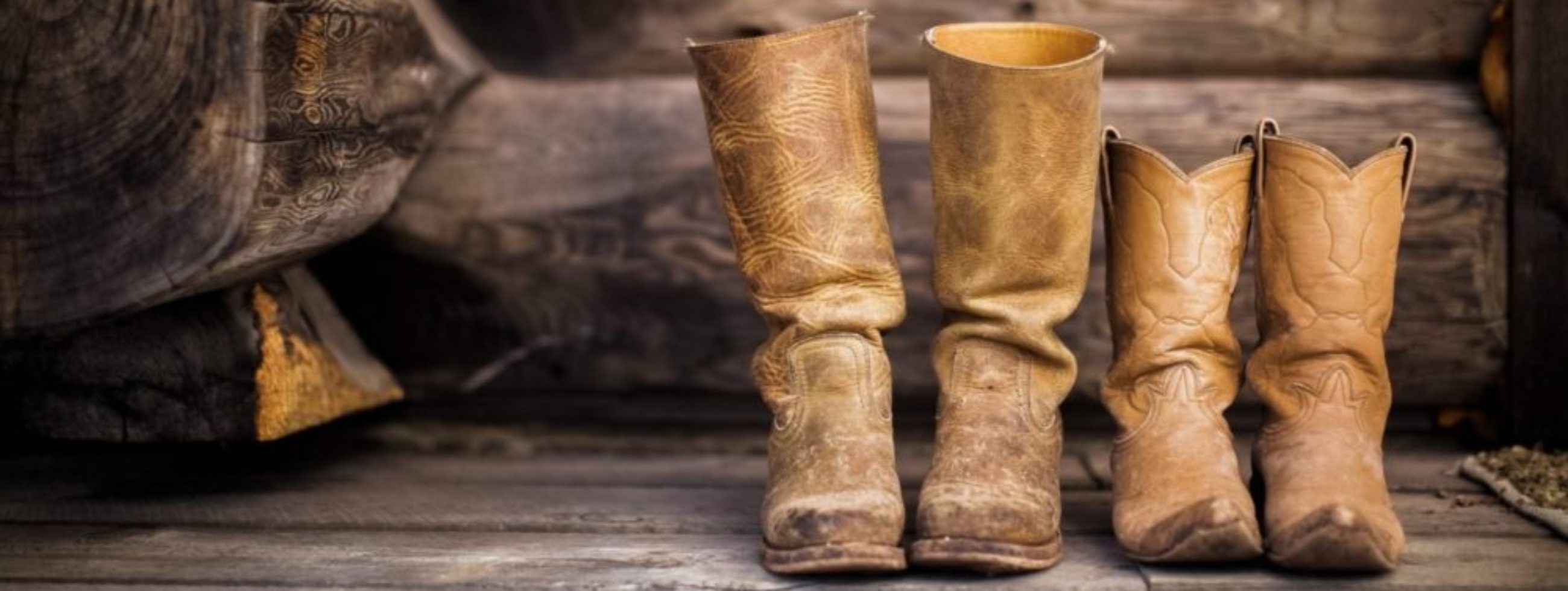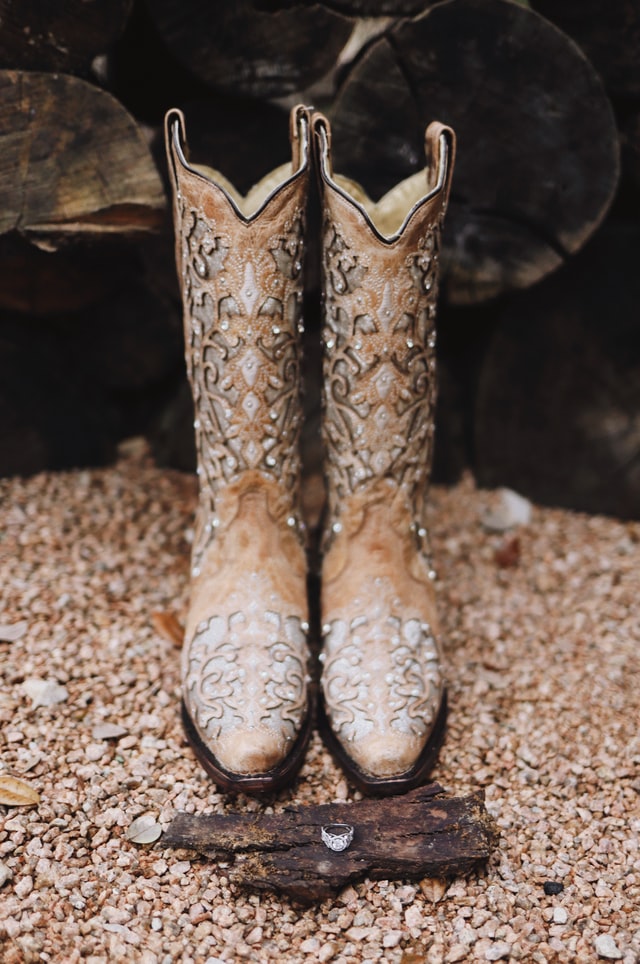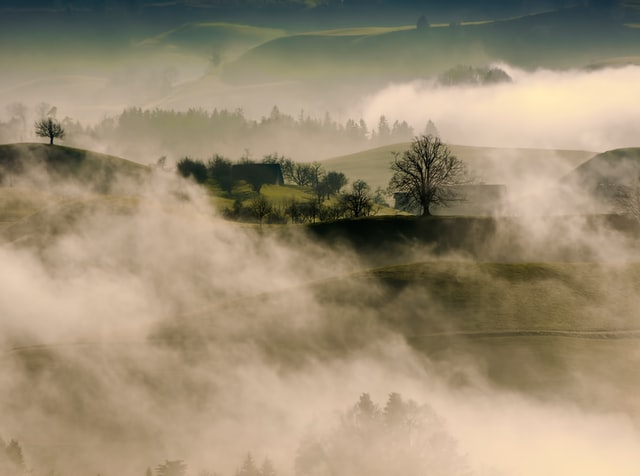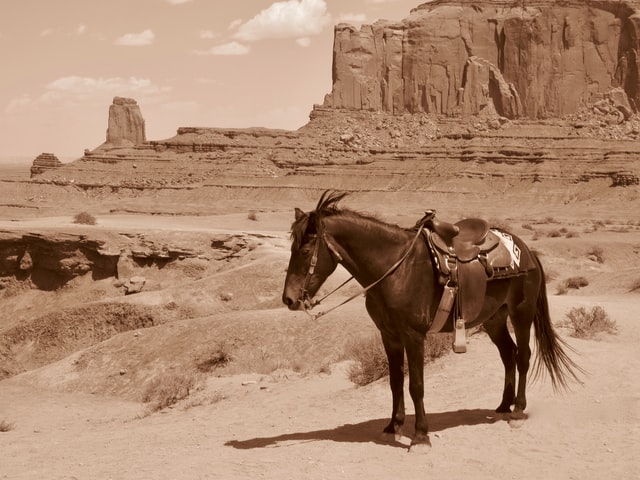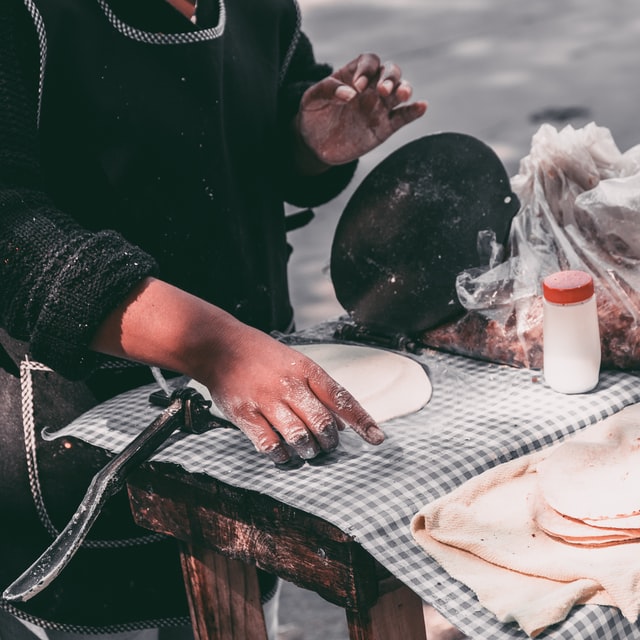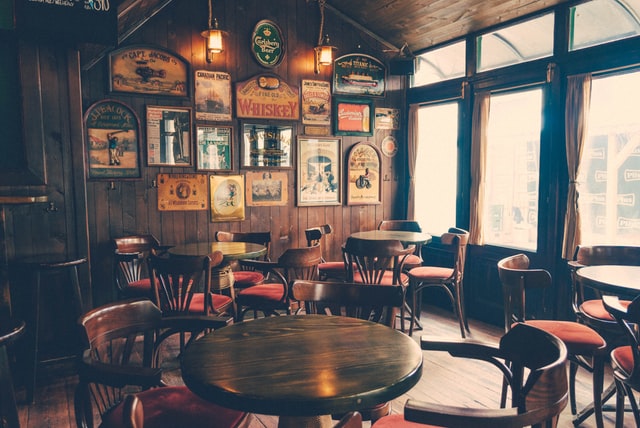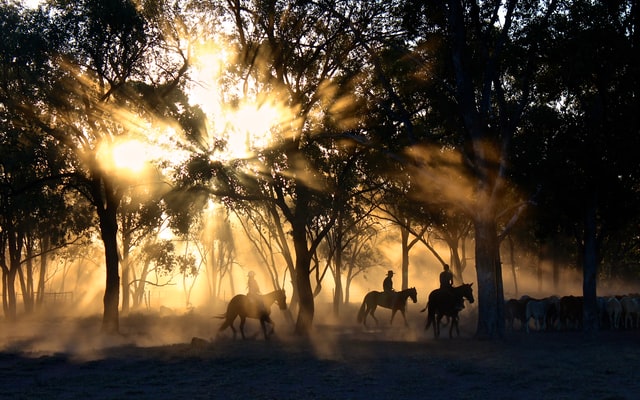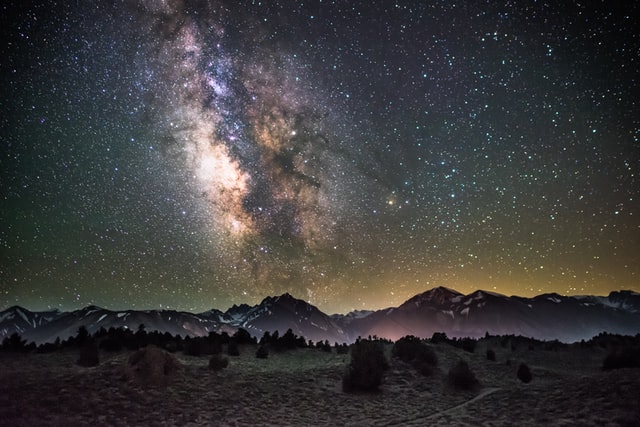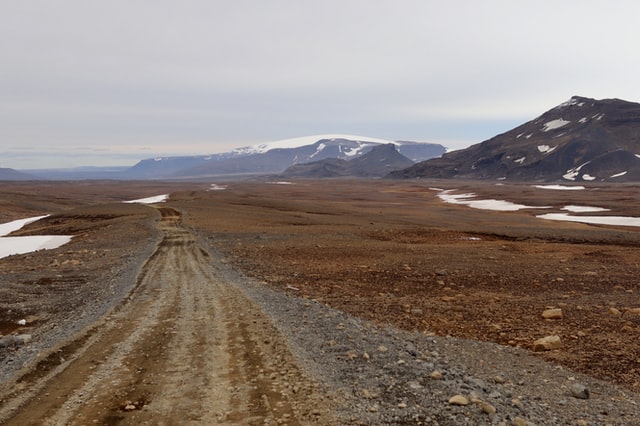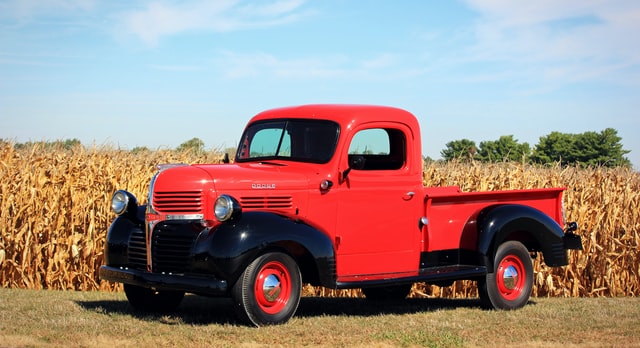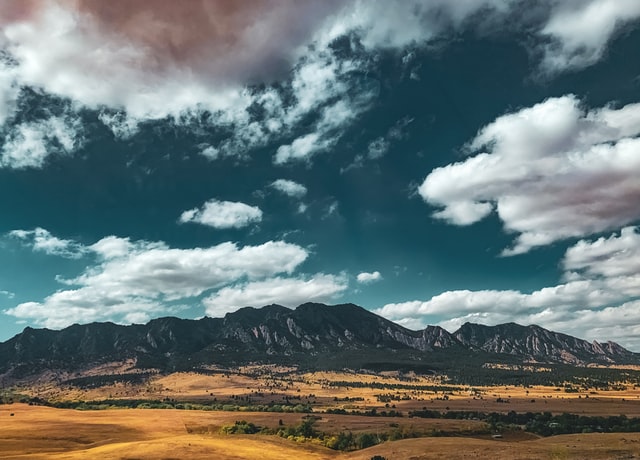Benito stuck the pointed tip of his boot into the arena’s sand and then dragged it in a semi-circle around him. He studied the groove he had made in the ground. It was deep and still, not silting, as though cut into clay. Benito swore under his breath and spat into the furrow. The sand was too heavy. The performers’ boots were going to get stuck, tripping them up and sending them tumbling, especially if some idiot with a garden hose came out and sprinkled the bullring down before the start of the program to ‘keep the dust down’. He cocked his knee and studied the boot. Two small gray pebbles, the kind that sliced into skin and bit into knees, shredding clothing and spirits, were lodged in the tight gap between the rubber sole and the stiff leather upper. While signing the contract, Benito had begged the fair committee not to skimp on the sand this year, the way they had the year before. It needed to be fine, like salt. It was much more slippery that way, but at least it didn’t reach up and grab the performers around the ankles the way this kind of slop did.
“Everything else is secondary,” he’d told them. “Food, lodging – even the ‘extras’. But see to the sand,” he’d said.
They’d laughed and told him he was getting old. There was a time when about the only things that mattered to the great skirt-chaser and cow dodger, Benito Sanchez, were the bunk arrangements and getting a bellyful of the local cuisine and vintages.
“Up yours,” he’d retorted, which had only made them laugh harder.
Benito slipped a thumb into the wide, decorative waistband all of the feria’s cow dodgers and jumpers wore. He’d put the thing on just twenty minutes earlier, and already it was digging into his flesh and hampering his breathing. Benito likened the damn thing to a girdle. On the other hand, just like a girdle, it hid some of his belly, especially when his spinning flung open his embroidered jacket. The waistband was horribly uncomfortable, but he was just going to have to live with it for a few hours.
Benito heard someone call to him, using the French version of his name.
“Hey, Benôit! Why aren’t you out running with the bulls?
“Benito followed the voice to the grandstand where a technician was putting the finishing touches on the sound system. The man was on one knee, near a microphone, taping its connecting wires down to the grandstand’s wide, wooden planks. He stopped working long enough to yank off his béret and used it to wipe the back of his neck. Then he reached for a tall glass that stood sweating on one of the amplifiers and took a long sip of its milky yellow contents.
“Want a drink?” the man asked, lifting his glass of pastis.
“No, thanks,” Benito responded. He did want a drink. His teeth felt like hot irons branding the inside of his mouth. He could almost feel the coolness of the anise-flavored liquor dousing them, but he would wait until after the performance. Maybe he was getting old.
“So, about the bulls?” the man asked.
Before the dodging and jumping program began, the fair committee ran the bulls around the perimeter of the village, and then completed the traditional run by driving them down the hill into the arena.
Benito stepped over toward the stage and stuck out his hand. The guy’s face was familiar from the year before. Benito shook the man’s hand, trying to recall his name.
“Nah,” Benito responded. “Too fat and too old,” is what he said. Too smart was what he was thinking.
The truth, of course, was something else. Some of the other performers like the young and enthusiastic jumper, Xavier, ran with the crowd that day, but Benito didn’t want to participate. It wasn’t that he was afraid of getting hurt. He was more worried that, while running around the village, all his abandoned hopes and dreams would rush past him. The city of Lefort, as its name suggests, was a fortified town built on a prominent hill. From that hill, he could see for miles; on a clear day, there was a spectacular view of the Pyrenean Mountains. An observation point, facing south, had been erected near the village gates. It was a wide, cement podium in the shape of a semi-circle. The tiled mosaic embedded into it depicted the vast countryside spread out before the observer, rendered in soft pastels. The highest mountain peaks were identified, and the approximate locations of cities in southwestern France and northeastern Spain were charted. Torn from his beloved homeland at an early age, the observation point only served to remind Benito of how far he had strayed from the things that truly identified him.
“Somebody always gets trampled,” the man said.
Benito shrugged and pulled out a pack of cigarettes. He offered one to the man, who took it, and then pulled out his lighter and lit both. “They know that’s the risk,” Benito said. “But that’s also why people stand around watching them,” he added.
“Maybe,” the man acknowledged.
“Sure it is. Why do you think people come down here if it’s not to see one of us get gored? Haven’t you figured that out yet?”
“Of course I have,” the man answered. “And it sure does bring in the crowds. Why do you think we invited you all back? You and your sorry bunch of animals.”
Benito pulled on his cigarette and listened to the man laugh. What could he say? Like most of the other cow jumping and dodging groups, Benito’s feria campera worked with its own animals. Many of the cows and bulls were old and haggard; others were young and gaunt. The animals’ entrances into the arena were almost always greeted by shrills and whistles. Benito was the first one to admit that these bovines were not the massive animals of his native land’s corrida, but the feria campera was a small minstrel show compared to that. This was a friendlier, French version of the corrida, one which was traditional in the Landes region on the Atlantic coast. In it, the young toreros who “fought” the bull only performed passes with a cape. They never used picadors, and none of the animals were hurt or put to death. The major part of the show involved performers like Benito who dodged the charging cow or bull by spinning away from it at the last minute and others who, in an impressive display of dexterity, actually jumped over it either in an open-armed swan dive or a forward somersault or with both feet straight out in front of them. Benito had noticed that, no matter how skinny the animal was, people in the arena usually stopped hooting and hollering once one of the cows charged the jumper or dodger.
The cow they used in the dodging event, Cecilia, was a running sack of skin and bones. But Benito knew Cecilia came from a ranch which specialized in raising animals for the Landaise fairs. Despite being thin and relatively short, she was restive and agile and particularly bad-tempered once she got up a head of steam. For all of her hangdog looks, it didn’t take much to make her mad enough to stick one of her sawed-off, tarred-over horns into someone’s ribcage.
But mostly she played the game by the rules.
For Benito and the other members of his group, that was the advantage of working with the same animals. After a while, they seemed to understand what was expected of them. Cecilia, especially, could usually be counted on to run in a straight line and at a steady speed – at least for the first few dodging attempts. It was up to Benito and the other members of the feria to recognize when Cecilia was getting past her limits of patience and tolerance and retire her to her box. The hardest part for all of the handlers and jumpers was training a new animal, usually younger than the others and more easily confused by the noise and movement around the arena. These were often the animals involved in accidents up in the village during the traditional Pamplona-style run. Whenever the Red Cross staffers administering first aid to the injured person complained about the animal to Xavier, who was in charge of external relations, he usually shrugged and replied, ‘just being a bull’. He often justified his laid-back attitude by reminding people the same principle held true inside the arena as well.
Benito heard the tinny sounds of a trumpet meaning the procession of bulls, cows, crowd, jumpers, dodgers and musicians was making its way down from the village to the riverside arena. Benito nodded to the technician and scooted behind the bandstand and into the shade. He wasn’t in the mood to face his public – not just yet. This was his first performance this year, and he had heard it was being billed as a ‘comeback’. The last time Benito had performed was almost exactly one year before in this very same village. But he hadn’t announced his retirement, either, and as he stood there under the bandstand, he wondered who had.
While Benito was lost in thought, Xavier, the bull jumper, appeared at his side, grinning like the proverbial cat that ate the canary.
“Got my date all set up,” Xavier announced.
Benito flicked the rest of his cigarette into the high, dry grass. “You are really disgusting,” he said.
Xavier turned, stuck out his butt, and wiggled his hips. “You’re just jealous.”
“Hardly,” Benito replied.
Xavier had certainly livened things up since he joined the feria. Thin and quick-footed, he was an excellent jumper – especially for someone not raised in the local tradition. Xavier, who went by the stage name, ‘Javier’, was a city boy who worked as a computer engineer in Toulouse during the week, and, unlike Benito, hadn’t grown up around horses and cows, much less corridas and feria camperas. Xavier had discovered the Landaise leap-over by accident on a late weekday afternoon visit to the village, five years earlier, as the arena was being set up. On the weekend, the riverside was a favorite destination for picnickers and extended amilies out for a post-dinner stroll. At sundown, it turned into a known pick-up spot for gay men, which was exactly what Xavier was doing there that evening.
When he signed on with Benito’s group, Xavier told them, “I’m a city-dweller and a gay man, and I don’t want to hear a word about it, since I’ll be out-jumping all of you before you know it. Okay? And I’m not Spanish, either. My family never fled from poverty or persecution. I’m Belgian and the only thing my family was running from when it came to the southwestern part of France two generations ago was the rain.”
Benito would never admit it to anyone, especially not to Xavier, but he was jealous of the way the young jumper lived his double life with such apparent ease. Benito’s lived his own Janus-faced existence with such lumbering difficulty it only recently occurred to him that any forward momentum he might have gathered over the years had stopped, maybe a long time before, without him even noticing it. At the feria, Benito was cast into the role of the fearless, macho womanizer who ate too much and drank even more, but only he truly knew the bloodless man who got up the next morning in the suburban home he shared with his wife and three kids to go off to a numbing day’s work stocking shelves at the local supermarket.
Before he left his home in the Basque region on Sunday morning to drive the 250 kilometers to Lefort, Benito made sure he said absolutely nothing to his wife, Cristina, about the talk he’d had with the store supervisor on Saturday.
“It’s early retirement or nothing,” his supervisor had told him. “Either way, you’re out. You’re too old and too slow. Whether you like it or not, supermarkets are a quick business. Turning stock over is everything and we need to keep up. You’re dragging us down.”
The union steward just smirked at him. Only a few days earlier, Benito had torn up his union card and had called the man a “prissy-faced ass-kisser”. So, there would be no one from the worker’s union putting any pressure on the head management to save Benito’s job, much less his dignity. He was forty-eight years old, and had little experience and less education. Who would ever hire him? Cristina would have to go back to work, and the thought bothered Benito. She was trained as a beautician, and had worked for the first ten years of their marriage in a corner barbershop catering to a local, Spanish-speaking clientele. It was Cristina who had introduced Benito to Jordi, the feria’s manager and bull-fighting master, who was a regular at the shop.
Cristina was popular at the barbershop. The local men liked having a pretty, platinum blond rub their temples and trim their beards. Benito was sure their rough-hewn hands were all over her smooth skin, and who could blame them? In their place, he would do the same thing. Whenever Benito picked Cristina up from work, he would park down the street and wait until she came out. He didn’t want to have to watch, helpless, through the large, plate-glass window while a customer was feeling up his wife.
“What’s eating you?” Xavier asked him.
“Nothing.”
“Liar. Where’s the old ‘feria fever’? Fired up? Burning!” Xavier swiveled his thin hips. “Burning!”
“More like burned out,” Benito admitted.
“Maybe it’s time to pass the reins, hey, hombre?” Xavier said, referring to Benito’s son Felipe.
“Oh, God,” Benito grunted. “Don’t remind me. Takes more after you than he does me.””Now, now.””Sometimes I wonder if he is really my son. He doesn’t even look like me.”
“He looks like Christine.”
“Acts like her, too.” Benito added. “Know what I found him doing a couple of days ago when he was supposed to be practicing his passes?”
Xavier shook his head.
“Drawing. Sketching scenes of the corral.”
“That’s right. He does draw. I remember that now. He’s shown me some of his sketches. I think they’re pretty good.”
Benito lit another cigarette. “I’m not saying they’re bad. You’re right. They are pretty good. But it’s not what he’s supposed to be doing out there. He’s supposed to be practicing his verónicas. Then he wonders why he keeps on taking a set of horns to the balls. The kid is never going to learn.”
“How old is he?”
“Thirteen.”
“Give him time.”
“I was a novice at twelve. So were all of my brothers.”
“Maybe he’s just not cut out for it.”
“He will be – once I’m done with him.”
“Ah, that’s what it is, isn’t it? No son of the great cow dodger and former bull jumper Benito Sanchez – “
“I only started dodging and jumping once we came to France. We don’t jump over bulls in Spain,” Benito stated in a clear, deep voice. “And we certainly don’t ‘dodge’ them. I was learning to be a matador when the economic situation in Spain forced us to leave. Over the course of one year, we moved from Madrid to Barcelona and finally to Perpignan before my father found steady work. And it’s only once I started working in Bayonne that I started this silly sport of avoiding bulls!”
“Better than killing them.”
Benito was still thinking about his son. “No one is asking him to kill the bull. If I wanted him to kill bulls, I would have sent him to the bullfighting school in Madrid. All I’m asking him to do is to make the passes without getting himself impaled.”
“He doesn’t have your stature.”
“Exactly.”
“What I mean is he’s too small. Teach him to dodge. Or I’ll teach him to jump. He shouldn’t be out there with a cape doing passes.”
“He’ll do as I tell him.”
Benito sucked on his cigarette. Xavier knew the gesture well enough to know it meant the subject was no longer open for discussion.
“What’s the program today? The usual?” Xavier asked.
Benito exhaled, coughed, and then puffed on the cigarette again. “Not exactly,” he began. “After we parade around a little bit with the others for the paseo, we’ll do our dodging and jumping. Dodging, jumping, and then dodging again. Then Felipe and another novice torero will try to keep from getting their balls skewered in front of a thousand people. Then a couple of guys from Madrid are going to do a kind of rejón, but don’t worry. They’ll be sticking their lances into a stuffed bull’s head mounted on wheels th at one of their guy’s will push around. Then some señorita is going to give a riding demonstration. Dressage.”
“Big program.”
“And there’s one more thing.”
Xavier looked worried. “What’s that?”
“Another person will be dodging today. A young woman.”
“A woman! Benôit, I got into this business because it was full of men.”
Benito laughed and flicked his cigarette away.
“What’s she like?”
“Haven’t seen her yet.”
Xavier turned serious. “I’m not taking a horn for her, Benôit. I’d take a horn for you, but not for some little girl out here trying to prove something.”
Benito cocked his head and stared at his friend. “We’re all out here trying to prove something, Javier.”
Xavier looked away.
“Besides, she’s supposed to be good. Jordi’s seen her,” Benito said, referring to the master bullfighter. “Otherwise, he wouldn’t have invited her.”
Xavier nodded, but continued to stare off towards the arena.
“And, hombre,” Benito continued, “you can leave the macho business up to me. That’s my department.”
Xavier laughed a little distractedly and stared over Benito’s shoulder.
“What are you looking at? Or let me guess.”
“That guy down there watering the arena. He’s got a nice –”
“Watering the arena!”
Benito stepped around his friend and towards the end of the grandstand to where he had a clear view of the arena.
“Burro!” Benito screamed at the man. “What an ass!”
Benito stuck both thumbs into his waistband and stretched it away from him, and then took a deep breath. “That’s all we need.”
“Relax, Benôit.”
“He’s turning it into wet cement! I can’t spin in that.”
“Relax, hombre. Sure you can. I just hope that little girl can, too.”
“Are you referring to me?”
Xavier and Benito exchanged glances before looking over their shoulders. A pretty young woman with long, straight chestnut-colored hair stood behind them. Thin and fit, she was dressed in the traditional short, sequined jacket, and tight, high-waisted trousers and wide cummerbund.
The young woman stuck out her hand towards Benito. “I’m Julie Jourdain. I’ll be dodging with you today.”
“Benito Sanchez. Con mucho gusto.“
Benito took her hand, and lifted it to his lips.
Julie smirked, but allowed him to kiss her hand before pulling it away. She then extended it to Xavier who took it, and then made an exaggerated show of bending over it, before kissing the back of his own hand.
“Oops,” he joked.
“Just what I expected from you,” the young woman said.
Xavier grinned. “My reputation precedes me.”
“Follows you is more like it.”
Benito grinned.
The crowd was slowly filing into the bleachers. A five-piece band from the Armagnac region was settling into the section reserved for it, playing a cascade of false notes, and stumbling past feet and knees. The tuba player had lost his béret and appeared apple-faced in the sun. His tuba was wrapped around his thick middle like a sleepy brass cobra. Both trumpet players had stripped down to their boxer shorts and were standing on the bleacher seats, singing and dancing something that looked like the Twist. The trombone player had removed the mouthpiece of his instrument and was spitting through it onto the drummer, who had laid his drum on his knees and seemed to have fallen asleep on it.
Benito considered the band members for a moment. “It’s almost time for the paseo. Somehow, I don’t think the band is ready.”
“Too much wine with lunch,” Julie remarked.
“Too much wine with breakfast!” Xavier retorted. “Those guys were already drunk when they showed up.”
Benito looked out over the arena. He felt a bitterness leak into his stomach, and could taste its acidity on his tongue. He was tired. Worse, he was disgusted. Over the 35 years he had been involved in bull fighting and cow dodging, he had never once had the desire to walk away from the arena. But he did that day. And he might have walked away, too, if the emcee had waited just one more instant before announcing the program, or if Benito hadn’t turned around to see his son, Felipe, dressed in his novice torero suit standing behind him, pale and shivering in the summer sun.
Benito and Xavier placed the bright-eyed Julia between them and entered the arena, followed by the two novice toreros, Felipe and a young Spanish sensation named Mauricio whose tall, classic good looks and regal bearing had already earned him much praise in bull-fighting circles.
Benito scanned the arena. He knew all three of the handlers, and trusted every one of them. Robert, an old friend, was coordinating the work on the ropes. He was the one who saved the dodgers and jumpers from injury by yanking on the rope attached to the animal’s horns at just the right moment, pulling the animal’s head away from a man’s spleen. Robert stood off to the left of the performers and fed the line connected to the rushing animal through heavily taped hands. By keeping the rope taut, Robert guided the animal along the performer’s left side so the dodger could spin out to his right, avoiding both the cow and the rope. But if Robert slipped or was pulled off of his feet by the animal or if he somehow misjudged the amount of rope to release, the cow was basically free to charge as she pleased and the dodger’s best plan was probably to turn tail and run straight behind him. Benito didn’t like to have to run away like that, and he certainly didn’t want to have to run today: the sand was too sticky and thick and he was far too out of shape. Plus, it always made the audience laugh.
Facing the performers was Serge, another friend of Benito’s. Serge was the one who held the animal on a short lead until the dodgers and jumpers were ready on their marks near the rear of the arena. But the heat and dust and noise all combined to make the animal so confused and furious that the terrible task of hanging onto it while the performers readied themselves was dicey at best. Serge protected himself from the angry animal by slipping behind one of four wooden palenques placed around the edge of the arena. Each was about the size and shape of the bottom half of a door, and there was just enough room between it and an outer chain-link fence for Serge to squeeze behind it. The cow or bull, tethered close by the hemp rope Serge struggled to hang onto, often rammed into the wooden apparatus in a feral effort to get at the handler. Benito had even seen a cow get her head stuck between the metal fencing of the arena and the wooden protection while trying to gouge Serge. If Serge let go of the animal too early, before the performer was ready, the dodgers or jumpers scrambled to safety behind one of the other three wooden palenques or climbed up and over the arena’s chain-link fence.
Finally, Benito turned to look behind him and studied Francisco, trying to gauge the state of the third handler’s sobriety. Francisco was the one who released the animals from their holding boxes beneath the grandstand and then rallied them back inside. Once the performer was in the arena, Francisco was the handler closest to him. While everyone in the arena, performers and handlers alike, always came to the aid of a downed jumper or dodger, Francisco was usually the one to reach them first. Like a rodeo clown, he helped the jumper to his feet all while trying to divert the animal’s attention away from him.
Francisco had the broken bones and scars to prove that he had, over the years, taken his share of horns and hooves, and more than a few of those in Benito’s place. That afternoon in the arena Benito noticed how poorly Francisco had aged since the previous jumping season. He remembered how often in the past year, while he had been away from dodging, he had heard that Francisco had stumbled sour-drunk into an arena. But Benito figured that if, like ‘Cisco, he had spent most of his life saving people who were too stubborn, clumsy or proud to save themselves, he’d probably be a stumbling drunk, too. Francisco had described his job once as ”throwing himself in front of a half-ton of meat and muscle for a lot of people who were usually not worth the trouble”. Benito hoped Francisco didn’t think he was one of them.
Francisco touched the beak of his béret in greeting to Benito, who was relieved to think that maybe the handler wasn’t all that drunk after all.
Benito, Xavier and Julie agreed Benito would begin their round of performances with several dodging attempts, after which Xavier would perform three or four different jump-overs. Then Julie would try at least two dodging attempts, and maybe a third, after which she and Benito would perform a tandem dodge to close out their part of the feria.
– The Cow Dodger –
“Hep!” Benito called out. “Hep!”
Serge worked the rope around Cecilia’s horns, pulling a short lead up and over the palenque, and then eyeballed the tautness of the rope between the cow and Robert.
“Hep!”
Benito could feel his heels sinking into the mixture of wet sand and pebbles. He had gained too much weight over the past year. His bulk was driving him right down through a layer of quicksand to the sun-baked earth beneath the arena. If Serge didn’t release Cecilia soon, Benito would be planted there like an asparagus when she charged him.
“Hep!” he called out again.
Serge released the cow. She ran towards Benito, but her eyes wandered and her head bobbed so that, all in all, her charge was pretty pathetic. Benito, noticing her distraction, waited until the last possible moment before twisting from her path. He thrust his belly out and to the right, but he felt his feet stick in the muck and noticed a slight pull behind his right knee. Benito heard a few boos and whistles and at least one “Olé” that sounded sincere. The veteran dodger looked behind him, and saw that Francisco had stepped out from the wooden brace, but Cecilia trotted on her lead, from the back of the arena towards Robert, who reeled her in like a trout. Serge stepped out from behind his palenque and taunted the cow, until she chased him back behind the palenque. While Cecilia butted against the wooden structure, Serge reached over the top and grabbed the rope, and then disappeared again.
Benito’s second attempt was rather like the first, except Cecilia charged him a little more earnestly, fixing him a moment and dropping her head.
By the third attempt, Cecilia had focused her attention entirely on Benito, who had enough experience to know the cow had started to equate whatever pain and discomfort she might be feeling with his presence. He dodged her, but after she had passed him, she tried to turn back for a second try. Only Robert’s expert handling of the ropes and Francisco’s intervention enabled Benito to scramble away towards the performer’s entrance to the arena.
A woman in the audience with a throaty, alto voice shouted “Olé!” and there was some appreciative applause. But Benito’s attention remained focused on Cecilia, who bucked and kicked and chased first Robert and then Serge behind their palenques. Benito figured he could try one more dodge before Cecilia became too unruly for Serge and Robert to handle.
Benito signaled to the emcee that this would be his final attempt and then raked the sand with his in-step, trying to even out the trench he had dug during his first three dodges. The top layer of soil had begun to dry. Benito scraped some of the drier sand into the depression his feet had made and then mixed it with some of the heavier, wetter sand, so thick it seemed like mortar. Part of him wanted to quit there, with three respectable dodges, so he could end on a good note his first time back in the arena after a year’s absence. His dodging that day had not been particularly brilliant, but there hadn’t been an incident, either. He had been lucky three times; his fourth attempt might not be so lucky.
Benito held both arms straight in front of him like a platform diver preparing to plunge.
“Hep!” He called out. “Hep!”
Serge had disappeared behind the wooden partition.
Benito slammed his arms to his side, smacking them against the tight cotton of his trousers, trying to rouse the cow towards him.
“Hep!”
Cecilia jumped and swirled like a whirling Dervish. She slammed the length of her body against the wooden palenque protecting Serge. Benito watched as Serge fought to hang onto the rope tied to the cow’s horns, his arm cocked around the edge of the palenque and turning purple with the strain.
“Hep! Hep!” Benito called out again, trying to get the handler to release the cow.
Then Benito realized Serge had somehow gotten the rope wrapped around his wrist. He watched Cecilia pull away from the wooden partition. It shook from a blow from behind. If Cecilia pulled any further, Serge would have to leave his hiding place and let himself be dragged by the cow in order to save his hand. If the cow then charged Benito, the dodger would have both man and beast barreling down towards him. He’d seen it happen before. Benito stretched both arms out in front of him and remained quiet.
Then Benito noticed that the spotting rope between the cow and Robert splayed like a rubber band. This meant Serge had been able to disentangle his hand from the rope, but had released the cow before Robert had been able to tighten up the slack on the line. The cow was nearly as good as free unless Robert was able to gather up the rope more quickly than the cow, charging towards Benito, could spool it out. For Benito, the rope was transformed from a life-line into a hangman’s cord: if the cow changed direction at the last minute and Benito spun into her, he’d get caught in the rope. If the cow turned back around to gouge him with a horn, the rope would wind around him and pull him to the ground.
Benito focused on Cecilia. The cow whipped around to face him, dropped her head and charged. Benito became so intent on her that the rest of the arena became a blur, a kaleidoscope of color spinning like a top before his eyes. The cries of the crowd swirled into white noise and for several seconds Benito was only really aware of the sound of Cecilia’s hooves striking the hard sand as she raced towards him. In the periphery of his vision, Benito saw Robert wheeling hand over hand, trying to tighten the line of rope. Behind the cow, Serge stepped out from the palenque, rubbing his bruised hand with the other. Both men seemed to move in slow motion. Benito registered the wild-eyed look of worry on both of their faces.
Benito took a deep breath. He had no choice but to spin to his right, otherwise he would get caught in the rope. He knew that and somehow knew the cow knew it as well. His other choice was to run as fast as he could behind him toward Francisco’s palenque. It would be a kindness toward Robert, whose hands were probably scorched beneath the tape and whose naked fingers were being cut to shreds by the rope speeding through his grip. But the audience would laugh and be pleased, and not understand the generosity behind Benito’s gesture. Benito stayed on his mark.
Long afterwards, he would admit Cecilia’s charge had been clouded by her fury. She attacked him straight on, though she ran towards him with uncharacteristic speed. Benito thrust his hips forward and began his spin to the right. In the milky air he thought he heard someone call out, Hep! Hep! from somewhere over his left shoulder, but the shout was so liquid and slow it barely broke the surface of his consciousness. Still, he saw Cecilia’s head drift ever so slightly away from the axis of her backbone in the direction of the shout. As he spun, Benito’s jacket flared in fine flamenco fashion, away from his body, and he felt Cecilia’s left horn flirt with the fabric. But she missed him.
He remembered his fall afterwards in the same way he witnessed the movements of Robert and Serge: in slow motion. The toe of the boot of his right foot dug into the unforgiving soil, and Benito fell to the ground like a piece of timber. He looked up in time to see the muscles in Cecilia’s forequarters contract as she shifted her weight forward and started to charge back towards him. He barrel-rolled away from her and covered his head with his hands. He knew he needed to get up and get away from the cow but he wasn’t as quick as he used to be. He couldn’t just pop up onto his feet the way Xavier could, all sinew and springing muscle.
Benito thought of his son, Felipe, the novice torero. He wondered if Felipe were watching him, rejoicing in his fall and the trampling that would no doubt follow. Benito smiled at the thought of his son turning vengeful, but had to admit to himself that Felipe was probably quivering with horror at the sight of his downed father, rather than thinking it was just what the lousy son-of-a-bitch deserved.
Benito heard Cecilia thunder by and then felt the ground shudder as she stopped, turning. He heard her exhale through wet nostrils. His back tingled in the horrible anticipation of her hoof stomping him. Then he heard a voice; then a second, and a third. Francisco. Robert. Xavier.
“Hep, girl! Hep!”
“Come and get me, Ceci. Come on!”
The ground rumbled one more time as Cecilia sprinted away from Benito and into the dark refuge of her box. Benito stood, and dusted himself off, before acknowledging a diluted ovation from the crowd. Then, with a sweeping gesture of his arm, Benito indicated the handlers and Xavier, all still inside the arena, each one laughing like a madman. Benito hazarded a glance back towards the arena entrance. Julie had her hands on her hips, and was shaking her head. Mauricio stood firmly on both feet and applauded. Felipe gripped the gate in front of him and looked down at his feet. To Benito, his son seemed pallid and trembling.
– The Landaise Leap-Over –
Benito rested his forearms on the top edge of the palenque closest to the grandstand. He watched Xavier embark on an impromptu paseo around the arena. The young jumper played to the crowd. He blew kisses, made eye contact, and bowed. The crowd loved it. Members of the audience blew kisses back, threw flowers, and screamed encouragement. By the time Xavier returned to the safety of the palenque, there was high color in his cheeks and his forehead glistened.
“You’re quite a showman, Javier,” Benito commented. His voice was viscous.
Xavier noticed the strange tone, but refrained from responding. “Ready,” he told Francisco instead.
Francisco acknowledged the young jumper by taking a step towards the holding boxes. As he walked past Benito, Francisco patted the veteran dodger on the shoulder. “He learned that from you,” the handler told him.
Benito frowned. “No, he didn’t learn that from me. I’m not like that.”
Xavier leveled his gaze at the dodger. “You used to be.”
The cocoa-colored cow that raced from the holding box was edgy and quick. She stormed into the center of the arena and stopped, and then swiveled her head from one side to the other and back again. Her skin rippled over her flanks. She seemed to consider her situation, and then realize she was trapped. In response, she charged Robert and Serge time and again as they worked to set the rope. Each time, they dove behind the protection of the palenques. Finally, Serge anchored the cow long enough for Xavier to take his mark.
Benito stepped behind the young jumper, a good ten paces back and several paces to Xavier’s right. Francisco took up his post behind Benito, but to his left so that each man had a clear line of vision to the cow. By standing there, Benito and Francisco diverted the cow’s attention away from the jumper, forcing the cow to run in a straight line through the jumper’s mark and beyond it, giving Xavier the time to perform his jump, recover and race off to safety. Their presence also encouraged the cow to keep her head down as she charged so she wouldn’t rear up and into the body of the airborne jumper. And, finally, Benito and Francisco helped to confuse the cow if Xavier abandoned the attempt. Benito knew Xavier well enough to know that the young man would only do so if the cow’s charge was erratic or if the animal attacked him from an angle. In that case, Xavier would run to the palenque to his right, while Benito and Francisco both ran back to Francisco’s palenque, but approached it from different sides so that the three men formed a starburst pattern. Usually, the cow could not decide which man to chase after, and so all three eluded her.
Xavier prepared his first attempt.
“Hep!” he called to Serge, who released the cow. Benito watched from behind as Xavier timed his jump. Benito saw the young jumper’s knees flex and then propel him up into a forward somersault and over the charging cow.
“Run!” Francisco screamed.
Benito turned and saw that Francisco had already taken several steps back towards his palenque. When Benito turned back towards the center of the arena, he saw the cow bearing down on him. Benito placed both of his hands under his belly, lifted, and sprinted for the palenque. He squeezed behind the wooden structure just as the cow rammed into it. Francisco slid into a crouched position next to Benito and cackled.
“Next time, hombre, you need to leave that sack of potatoes at home.”
Benito pulled his hands away from his stomach. He heard first Robert, then Serge call to the cow and knew they were drawing the animal back towards the top of the arena. A minute later, Xavier was by Benito’s side, his face creased into laugh lines. He patted Benito’s belly.
“You need to be a little quicker than that, my friend.”
Xavier and Francisco stood and looked out past the palenque, but Benito remained crouched behind it. He thought of what his boss at the supermarket had told him the day before. You’re too old and too slow.
Benito’s right knee felt stiff. He had to grab the top board of the palenque to pull himself into a standing position. Once he did, he saw that Xavier and Francisco were on their marks. Both turned to look back at him. Benito shook his head. He wouldn’t spot Xavier as he had for the first leap-over. He’d run into the arena if he had to, if Xavier fell or abandoned the attempt. And, once Xavier had jumped, Benito would step out from behind the palenque to play his part in keeping the cow from turning back on the jumper, but he wouldn’t spot Xavier from behind. He couldn’t outrun the charging cow.
Benito winced as he watched Xavier remove the red bandana he wore around his neck and tie his legs together at the knees. Even though Xavier had admitted to Benito that the jump looked much more difficult than it actually was – Xavier said he kept his legs together when he jumped, anyway – Benito reached down and rubbed his own, aching joint, and decided he would only step from behind the palenque if Xavier missed his landing and fell to the mucky arena floor. But Xavier didn’t miss the landing, or any other part of his jump. The crowd cheered, and Benito heard the brassy-voiced woman scream, Olé! Even the five-piece band woke from its slumber and played a sleepy refrain. Xavier rested at the opposite palenque while the three handlers worked the cow back into position.
“You all right?” Francisco asked Benito as he slid behind the palenque.
For his third and final jump, the young jumper removed his béret, and flung it, upside down, to the arena floor. Then he stepped into the béret, and worked its borders up and around his shoes, trapping his feet inside. Finally, he tightened the red bandana around his knees.
Benito turned to Francisco. “Knee’s acting up.”
“Stay back here, then.”
“I’ll be out there if you need me.”
Francisco slapped him on the shoulder. “I don’t think we’ll need you.”
Had Francisco said a similar thing to Benito even one year earlier, Benito would have punched the handler’s lights out. Instead, Benito bit his tongue hard enough to draw blood.
Xavier executed a perfect jump and exulted to the crowd’s standing ovation.
-The Double Dodge-
“Want me to do the double dodge for you?” Xavier asked Benito while they watched Julie choose her mark for her first dodge attempt.
“I’m fine.”
“Benôit, don’t be a macho –”
“I said I’m fine.”
“It’s the first feria of the season. There will be plenty of others.”
Benito glared at Xavier. “Basta! Enough said about it!”
Xavier sighed and shook his head. “I’ll spot for her then. Stay here.”
Francisco released Cecilia from her holding box. She bucked out sideways in such a fit of rage that she stumbled and fell, charged Francisco, and then tried to get back into her holding box. Wet sand sprayed from Robert’s heels as he clung to the rope. Cecilia dragged him several feet.
“Uh-oh,” Xavier mumbled.
“Maybe I should have let Julie dodge first,” Benito said.
Xavier raised one eyebrow. “That would have been odd.”
“Why?”
“Starting out with a newcomer.”
“Maybe. But Cecilia was calmer.”
Xavier nodded, and the two men exchanged glances. Benito well knew what his young colleague was thinking: there was nothing that riled Cecilia more than contact with cloth. Benito’s near miss had excited her.
“I should spot the girl.”
“Woman, you mean” Xavier said. “She’s a grown woman. Stay here.”
“Cecilia will be coming after me.”
“All the more reason,” Xavier responded.
In the center of the arena, Julie took up her stance, arms stretched out in front of her. Xavier stood at the spotter’s usual distance, some ten paces behind her and to the young woman’s left. Xavier would make a move to his left just before the cow reached the young dodger hoping the animal would charge him, giving Julie a wider margin of error. Benito stepped around the wooden structure, but remained standing near it.
“Hep!” Julie called out.
Benito saw Xavier smile. The young woman’s voice, sweet as dulce con leche, could barely be heard above the din of the crowd. Serge released Cecilia but, instead of charging Julie, the cow veered straight towards Benito, who waddled the few steps to the palenque, and then stuffed himself behind it. Cecilia threw her full weight into the structure while Benito cowered just one thickness of wood away. The crowd roared with laughter. Some people applauded, others whistled. Julie, puzzled, remained on her mark with her arms stretched in front of her. Robert and Serge had trouble enticing Cecilia back to the top of the arena.
Xavier joined Benito. “You win.”
Benito pulled himself into a standing position. “What did I win?”
“The right to spot Julie. Otherwise, there is no way that old cow is going to come anywhere near her.”
Benito glanced over at Cecilia. Serge had clamped the cow’s head close to the palenque, so that her right horn was nearly touching it. But the cow’s left eye found Benito and fixed its gaze on him.
Benito extricated himself from his hiding place. He limped forward. “Maybe we could do the double dodge.”
“First?”
Benito nodded.
“That’s not fair, Benôit. Julie hasn’t even gotten a warm-up run. She should have at least one dodge attempt on her own. You know that. And she’s supposed to dodge twice before the two of you dodge together. Plus, Cecilia just made her look like an idiot.”
“I’m the one who looks like an idiot.”
“You could leave the arena.”
Benito straightened his shoulders. In all of his years of cow dodging and bull fighting, he had never once fled the arena.
“I can dodge,” he stated.
“But you can’t run, so you shouldn’t spot.”
“I’ll stand behind you and Francisco.”
“And then what? Limp to the holding box and hide behind the door?”
“If I have to.”
“And look like an idiot.”
Benito clenched his teeth.
“Why don’t you go take a leak before the double dodge, eh?”
“Are you afraid I’m going to pee in my pants?”
“Just some advice someone gave me a long time ago.”
Benito frowned as he remembered his first conversation with Xavier.
Xavier’s had retied his red bandana around his neck, and Benito found he was unable to take his eyes off it. Benito thought of the way Xavier jumped, with his knees bound together, and felt the red cloth tied for an instant, tourniquet-like, around his own, aching knee.
“Good advice,” Benito said, before leaving the arena.
Julie made three good dodges. Benito listened from beneath the grandstand as the emcee commented on each one. During the crowd’s ovation for the first attempt, Benito leaned against an iron girder and urinated. During the second ovation, he lit a cigarette, half of which, during the third ovation, he ground into the dirt. By the time the emcee announced the double dodge event, Benito had limped to the performer’s entrance.
Benito stepped into the arena and motioned to the band. The drummer, still half asleep, banged out a somnolent tune. Benito nodded his approval, then spread both arms wide, and lifted his chin. He took a small step with his right leg and, as he hopped forward with the left leg, threw his arms into the air.
“Olé!” shouted the woman in a resonant alto.
Benito turned towards the sound of the voice, and took another dramatic step.
“Olé!” she shouted again, and was joined by several other spectators.
Benito turned to a different section of the bleachers, repeated his triumphant gesture, and, in that way, threw himself forward on his bad leg.
“Olé!”
Benito observed with satisfaction once he reached the dodger’s marks that Xavier did not dare to comment on the veteran dodger’s grand entrance. Instead, Xavier quietly took his place near Francisco at the rear of the arena. While Benito positioned himself behind the young woman, he thought of how a good matador always stared down a bull. As a novice bullfighter, he had been taught to stare an animal into subjugation, to overpower it with his eyes long before he plunged the picador into the animal’s neck. Now he was also coming to learn that sometimes the subjugation goes the other way. Benito planted his left foot on the arena floor and rested his right foot on the sand. Then he lowered his gaze, and prayed for Julie’s safety.
He noticed Julie’s right foot was slightly behind the left and wondered where she had learned that dodger’s trick. Evidently, the girl had grown up around the arena. He tried to recall her family name. Durand? Dupont? Something French. In any case, it wasn’t a name he knew. It wasn’t the name of any of his amigos, none of his friends from the Basque country or the Landes region. Besides, she was too old to be the daughter of a compañero, although Benito supposed it was possible she was the niece of someone he knew. His gaze slid up her calves. Beneath the brushed cotton of her pants, her muscles were tense. Maybe she was from one of the families that raised horses in the area. Benito settled his gaze on the backs of the young woman’s thighs, and decided that Julie had that long-legged look of a woman rancher.
“Hep!”
Benito was relatively convinced that the girl didn’t have a drop of good, Spanish blood in her. She didn’t look anything like most of his countrywomen who were generally dark, short and sturdy. In fact, Benito decided, she was built just like a young filly: tall and slender, with her buttocks perched up high and shaped like crescent moons. Benito saw that her buttocks were smooth and seamless, and wondered if Julie were naked beneath her dodger’s attire. He stretched his arms in front of him and let his hands float in the air near her narrow hips. He fantasized for a moment about grasping those hips and turning them towards him. Suddenly, as if by magic, the hips did turn. Benito watched them swivel and felt his excitement mount. When he lifted his head to stare into the young woman’s eyes, though, his gaze fell on an infuriated Cecilia charging towards him.
He didn’t have time to dodge – he barely had time to get his thoughts out of the way. Cecilia rammed a blunted horn into Benito’s left side as he tried to escape by pivoting on his bad leg. He gasped once, more out of surprise than lack of breath, and then staggered a step. A sour taste rose into his mouth and, as he fell, he found himself trying to identify it. He heard voices, stampeding hooves and trampling feet in the noise swirling around him, but like the eye of the storm, he was calm. The sand was warm against his cheek. He felt comfortable even, almost sleepy, and relieved to have his weight off of his bad leg. He closed his eyes.
“Benito!” Francisco called. He pulled on the dodger’s arm. “Levántate, hombre.”
Benito rolled onto his back.
“Benôit!”
Benito opened his eyes and saw Xavier kneeling next to him.
“Can you get up?”
“Imbécil,” Benito muttered. “Of course I can get up.”
The veteran dodger struggled to his feet. The arena was quiet, and Benito knew that silence meant the spectators were caught between satisfaction and self-loathing. They had secretly been hoping someone would get hurt, and now that someone had, they found hated their own desires.
Benito began to brush himself off. Julie and Francisco both stood a respectful distance away, but Xavier grabbed the dodger’s elbow.
“C’mon, I’ll help you to the gate.”
Benito yanked his arm from the young jumper’s grasp.
“Leave him, hombre,” Francisco said.
Benito lifted his chin, but stood his ground. He shooed Xavier away.
“You’re not going to try another dodge, are you?”
“Javier! Leave him,” Francisco insisted. He motioned to the grandstand.
The crowd cried out when the emcee announced that Benito would attempt another dodge. Benito felt the torrid air sear his lungs as the announcer explained the dodger’s creed: no matter how hurt or suffering, no dodger with a sense of pride ever ends a performance on such a note.
Cecilia, Benito noticed, had calmed down. He knew her well enough to know that her rage was spent, and that she was tired. Benito raised his arms, but not directly in front of him, the way a dodger did, but off to the side, more like a dancer. He lifted his chin, but lowered his gaze and caught Cecilia in a stare-down.
“Olé!” he shouted.
The crowd burst into applause.
Cecilia charged him, quick and head-on. Benito raised his arms over his head, and pirouetted away from the animal. A thousand strands of pain threaded through his knee as he spun so that Benito had to bite his lower lip to keep from crying out. Cecilia ran past him, past Xavier and Francisco and directly into her holding box. Benito remained facing the rear of the arena and watched the expert hand of Francisco release the cow, and gather up the ropes. His face bathed in sweat, Benito turned to the crowd and bowed.
-Los toreros-
Benito pressed a coin into the flower vendor’s hand, and selected a single red rose, its young petals only slightly parted. When Mauricio strode by, hat in hand, to acknowledge the audience’s applause, Benito tossed the rose at the young torero.
“Muy bueno, hijito,” he said. “Good job, son. Good job.”
Benito turned his back to the arena to light a cigarette as his own son, Felipe, began his paseo. Benito took a long drag, and then exhaled slowly, savoring the smoke. He saw Xavier making his way back from the woods surrounding the arena. He watched as the young jumper smoothed down his hair, straightened his jacket, and tucked his shirt more neatly into his pants.
“That was quick.”
Xavier grinned. “Those kinds of rendezvous are always quick.”
“You’re going to get sick someday. You should be more careful.”
Xavier patted Benito’s belly, then reached up and snatched Benito’s cigarette from the dodger’s mouth and threw it to the ground. “So should you.”
The two men stared at each other for a moment, before turning their attention back to the arena.
“How was Mauricio?”
“Perfect,” Benito answered. “He shall be a grand torero one day.”
Benito’s gaze followed Felipe as he finished his paseo. The boy walked to where his father and Xavier were standing, and waited for his father’s blessing. Benito was a good head taller than his son, who stood before him, looking down. Benito reached over the arena’s fence and lifted the boy’s chin, but quickly released it when he recognized the fear in the adolescent’s eyes. The veteran dodger shifted all of his weight to his left leg, and spat on the ground.
He waited while Xavier shook the boy’s hand.
“Good luck, Philippe,” Xavier said.
Benito reached back over the arena’s fence and smacked his son’s skull so hard with the flat of his hand that tears rose into the boy’s eyes. Then he sent his son off with a flick of his hand.
“You can be such an asshole,” Xavier whispered.
“Mind your own business, maricón.”
“Go ahead, call me queer. I still don’t know how you can treat your son that way.”
“What would you know about raising a son?”
“More than you think. I’m someone’s son. Remember?”
Benito looked at Xavier out of the corner of his eye. “So, it’s your father’s fault that you’re a pansy?”
“Maybe not,” Xavier admitted. “But it’s his fault I hate his guts.”
Benito threw his chin into the air. “It’s not important if Felipe hates me. The only important thing is for him to learn courage and persistence. He needs to learn to never, ever give up. He needs to know how to stare a bull in the eyes and not back down.”
Xavier sniggered.
“Go ahead and laugh, mujer. You with your quick sex in the woods, what would you know about courage? You jump men, cows. What’s the difference to you?”
“Need I remind you that you avoid them?”
“I hold my ground until the last possible moment. I defy them to hurt me. And when they do, I get up and defy them again.”
“I thought we were talking about Philippe.”
“Felipe is my son and he will do as I tell him.”
Benito and Xavier heard the crowd burst into laughter. When they looked into the arena, they saw that Jordi had had Francisco release a torete, a small, young bull, for Philippe to fight.
“At least Jordi has some compassion for him,” Xavier remarked.
“Jordi mocks my name with such an animal,” Benito muttered. “Jordi himself has larger horns!”
The two men tumbled into silence as Felipe began his passes. It was obvious to Benito from the start that his son couldn’t handle the situation. He mumbled in disgust as Felipe backpedaled whenever the bull charged or chased. He noted that the boy held his crimson cape high and close to his hips, despite Jordi’s repeated shouts of, A bajo! A bajo’, admonishing the novice torero to keep the cape down and away from his body.
Benito was certain everyone saw that, the first time the boy went down, it was simply because Felipe had tripped over his own two feet. Jordi and Mauricio dashed from behind the palenques to distract the bull away from the young torero, but not before the animal had butted the boy several times in the groin. Benito saw how the boy’s face flushed, the same way it did when Benito disciplined him. Was it Benito’s imagination or did he detect a slight tremor in the boy’s legs?
The speed with which Jordi reached Felipe the second time the young man went down surprised even Benito. The veteran dodger watched as Jordi put himself between the young bull and the novice torero, but not before the bull had caught the adolescent again with his horns, driving the boy once again to the ground. Benito found Jordi much more attentive towards Felipe than the master bullfighter had been towards the other torero, Mauricio. As Jordi helped Felipe to his feet, Benito thought he detected a slight resemblance between the two that he had never before noticed. Both were rather fair-haired and fair-skinned, whereas Benito was dark-haired and had olive-colored skin. He also thought they had very similar builds. And there was something about the eyes, Benito thought. Finally, Felipe was fine-featured in a way that he, Benito, was not.
Benito could tell from the way the boy went down the third time that Felipe was exhausted, beaten. Benito imagined how his wife, Cristina, would yell at him once they had returned home and she found her son black and blue with bruises, his delicate skin cut and bleeding. Jordi escorted the young torero to a palenque, then bent close and spoke to the boy. Benito noticed that Felipe listened to his trainer, but looked over at his father. Meanwhile, Francisco corralled the young bull back into the holding box. Benito watched all of the proceedings without displaying the slightest bit of interest. He heard the crowd’s weak applause as Felipe circled the arena, taking his bows. Several spectators threw flowers and the throaty-voiced woman managed a mild, charitable, “Olé”.
“Are you okay?” Xavier asked the boy.
Felipe nodded. Benito looked away. To him, Felipe was as sallow and soft as a church candle. Benito was ashamed to think the boy had Sanchez blood.
“Papa,” Felipe said, “Jordi thinks I should stop.”
Benito studied his young son. “Is Jordi your father?”
He shot a menacing glance at the master bullfighter.
“Papa!”
Xavier spoke up. “Benôit, can’t you see the kid is –”
“Stay out of this!”
Benito focused his attention on his son. The cow dodger spread the fingers of his right hand and lowered them onto the boy’s head. By gripping his son’s skull, Benito forced the boy to pivot on his shaky legs.
“Do you see the people there in the bleachers? Pick one. Anyone.” Benito turned the boy’s head back so they were face-to-face. “Now, tell me if you think you will be able to go up to them after the feria and look them in the eyes.”
Felipe tried to lower his head, but Benito grasped the boy’s soft skull with fierceness, and forced the boy to look at him. To Benito, the boy’s red eyes, the tears welling near the lids, were like a matador’s cape: they infuriated him.
Xavier again interceded. “Benôit, the boy has had enough. Can’t you see that?”
Benito continued to stare at his son. “In the Sanchez family, we have a saying. Only when a man can look a beast in the eyes, is he ready to look another man in the eyes.”
Xavier rolled his eyes. “Another macho –”
Benito turned his attention to the young jumper for an instant, before turning back to his son. “What would you know about looking a man in the eyes?” he snarled.
Xavier shook his head and stomped away.
“Benito,” Jordi said, walking up to them, “the boy is hurt.”
“I’m hurt,” Benito stated. “That didn’t stop me!”
Jordi frowned. “But he could get seriously injured, Benito.”
“Life is full of injuries, isn’t it, Jordi?”
“He’s just a boy.”
“Then it’s time he became a man.”
Benito turned the boy away from him and with a hard push between the tender shoulder blades, shoved his son back into the arena.
Andrea Dejean is an American-born writer permanently based in southwestern France. She is a keen observer (though often a less willing participant) and writes because it is how she tries to make sense of what she sees in the hopes of better understanding the behavior of those around her.
